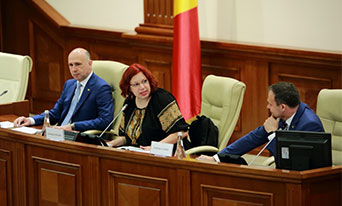Annual conference in Moldova continues commitment to strengthen role of civil society
The Parliament of Moldova, government ministers and a coalition of civil society actors from across the country met in July 2016 at the Annual Parliament-Civil Society Cooperation Conference to discuss their collaborative work to strengthen civil society and accountable government in Moldova. Attendees addressed the government’s current pledges to create an environment that enables civil society organizations (CSOs) to operate. The conference illustrates the government’s deepening commitment to engaging civil society as part of its path toward European Union (EU) integration.
Close to 150 members of the executive and legislative branches of the Moldovan government, representatives of civil society organizations and donors attended the two-day conference in Chisinau, the capital. Attendees included U.S. Agency for International Development (USAID) Senior Advisor on Governance, Rule of Law and Anti-Corruption, Suren Avanesyan. Moldovan Prime Minister Pavel Filip spoke about the important role of civil society in the country’s democratic development. He noted, “Pressure from the civil society mobilizes the government, makes it work more and closer to people’s expectations … [and] help[s] us reach the best formula of cooperation, so both the government and the civil society achieve their goal: a better government at any level, in the people’s interest.”
This year’s conference, co-funded by FHI 360’s Moldova Partnerships for Sustainable Civil Society project (MPSCS), was organized by Moldova’s Parliament and the National CSOs Council of Moldova, a coalition of organizations working to foster a favorable regulatory environment for the sustainable development of the civil society sector. Seven MPSCS grantee organizations attended, and MPSCS Chief of Party Anatolie Beleac spoke at the conference.
The conference received national print, radio and television coverage, which is unprecedented for events of this nature in Moldova. Coverage included the public national television station Moldova 1; private television stations Publika, Realitatea, Prime and Canal 2; Radio Free Europe; Radio Chisinau; Moldpres; and IPN.
The event culminated in Moldovan authorities renewing their commitment to:
– Revise the Law on Transparency in Public Decision Making, originally passed in 2008, to ensure citizens’ participation in public decisionmaking. Civil society organizations hope to strengthen the existing law to increase the timeframe for public consultations from 15 days to one month. They also hope to create a National Participation Council, consisting of publicly selected civil society organizations, to attend government meetings and provide comments on draft laws.
– Create a Coordination Unit to revise the Civil Society Development Strategy 2012–2015 and to implement the new plan to strengthen Moldovan civil society. The Civil Society Development Strategy aims to foster a favorable environment for active development of civil society, strengthen the financial viability of civil society organizations and promote active citizenship and volunteer work.
– Vote on an income tax mechanism (now passed) to allow Moldovans to contribute 2 percent to civil society organizations — a funding mechanism popular in other Eastern European countries. Civil society organizations in Moldova will be able to receive funds through the mechanism beginning in 2017.
– Pass the draft law on social entrepreneurship to allow civil society organizations to create social enterprises and generate income. Previously, the absence of such a law was a significant barrier to the sustainability of civil society organizations in the country.
This year’s conference comes on the heels of government meetings in March with the EU’s Association Council to discuss the status of the Association Agreement signed in 2014. The agreement mandates that the Government of Moldova consolidate its cooperation with the civil society sector, and it lays out specific steps the government must take before it can integrate with the EU.
Supporting the Moldovan government’s efforts to increase collaboration with civil society is central to the mission of the MPSCS project. Over the course of the next year, the project will continue to work with its partners to further strengthen Moldovan civil society and hold the government accountable to its citizens.
Source: www.fhi360.org
